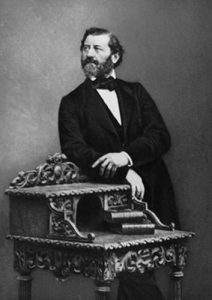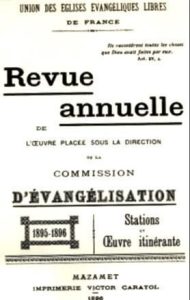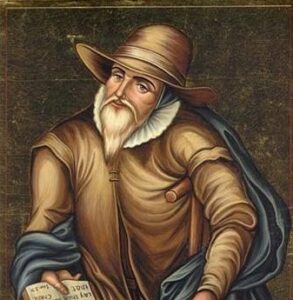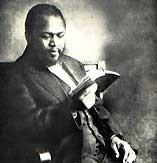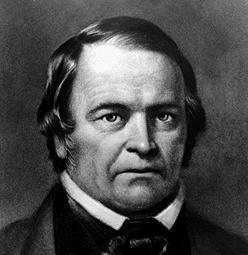A history of the Free Evangelical Churches
In 1804, the Concordat of Napoleon gave back to the Eglise Réformée (Reformed Church) its former rights, although the Consistory remained controlled by the State, meaning the State had a say in the appointment of pastors. This revived many schemes within the Church, much debating about Protestant identity and about the role Protestants should play in the towns of France. Amongst the many different aspects of Protestantism at the time, two main groupings stood out : the first was liberal, inspired by the consequences for society of recent scientific and technical progress ; the second was influenced by the Swiss and Anglo-Saxon Revival movements, advocating evangelism and missionary activity, but they thought that over-involvement with the contemporary world would distract the Christian from the basic tenets of his faith.
At the time of the liberal revolution of 1848, the most important argument between different Protestant groups was about the relationship between the Protestant Church and the State and several communities no longer wished to be under its control. At the General Assembly of Protestants in 1849, some of the Churches, who subscribed to the Confession of Faith of La Rochelle, chose total independence from the State. They joined with the Independent Churches (of the Revival movement), and some evangelization organizations, to form the Union des Eglises Evangéliques (Union of Evangelical Churches), which publicly proclaimed its independence from the State. Frédéric Monod and Agénor de Gasparin drew up a statement of their beliefs : belief in the Scriptures, belief in the Reform movement, keeping to “sound doctrine” and a complete separation between the Church and the world around it.
Fundamental points of doctrine
The Union des Eglises Evangéliques Libres (The Union of Evangelical Free Churches) affirmed its adherence to the spirit of the Reform movement and it refused to make any compromise with the State. It saw itself continuing the teaching of the Primitive Church as it was demonstrated in the Councils of Nice, Constantinople, Ephesus and Chalcedonia. The introduction to its Confession of Faith affirmed the sanctity of the Bible : “God, after He had spoken to the People of Israel through his prophets, was perfectly revealed in His son Jesus Christ. The Bible is the infallible expression of this same revelation.”
Its founding dogmas were a deep commitment to keeping the “sound doctrine”, which insisted on the supreme authority of Holy Scripture. Apart from submission to the authority of Scripture, it was also necessary to distinguish essentials from non-essentials. One of its founders quoted the following saying, which clearly identified their ideas : “In essentials, unity ; in non-essentials, liberty ; in all things, charity”.
Its Churches did not just claim to be Evangelical, they wanted to live out their faith as well. And what’s more, as faith was not just a doctrine but also a spiritual relationship, a personal dimension was important to them – indeed, they related to God through Jesus Christ.
Members of the UEEL like to call themselves “libristes” because of the two meanings associated with this word : first, they are faithful to the Book (“libre”) and spend a great deal of time studying biblical texts and circulating copies of the Bible (they are leading members of the Alliance Biblique (Biblical Alliance)).
Another meaning of “libre” is to be free, so they also stress they are free compared with the world. Even though they have an ethical viewpoint concerning problems in society, they do not want to be too involved in politics and their ministers are not allowed to take an active role in party politics ; this is quite surprising as several of their founder members were leading politicians of their time.
Organisation
The Free Evangelical Churches of the UEEL are confessing Churches. Their members make an open profession of faith (which is evangelical and reformed) at the same time confessing their personal conversion and promising loyalty to the main tenets of their faith. Sympathisers who have not made an open confession of faith are also warmly welcomed into the community.
In France there are 27 main Churches and 23 mission points situated in medium and large cities throughout the country, with 44 pastors.
On the local, regional and semi-synodal level, the UEEL’s main concern is unity over essential issues. However, in non-essential matters, the more varied the situations and experiences the better for churches and it is important they can adapt to different circumstances.
The Synod meets every 2 years. It elects a Synodal Commission composed of 10 members (5 lay members and 5 pastors) who are responsible for the smooth running of the UEEL.
Usually the pastors are trained at the Faculté Libre de Théologie d’Aix en Provence (Free Church Theology College at Aix-en-Provence), or else at the Faculté Libre de Théologie Evangélique de Vaux sur Seine (Free Evangelical Theology College at Vaux sur Seine). They are recruited by a Ministerial Commission which is appointed by the Synodal Commission and officially acknowledged by the Synod following proposal by the Synodal Commission.
For members of the laity teaching the catechism, or with diaconal responsibilities, training at a local level is possible.
The UEEL is heavily involved in missionary work :
- within France, in Bible study groups and the distribution of Bibles or Bible commentaries ;
- overseas missions ,notably in the South Pacific and in the Republic of Congo (Brazzaville).
The UEEL has a monthly magazine : “Pour la Vérité” (For the Truth)

